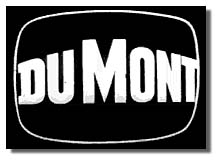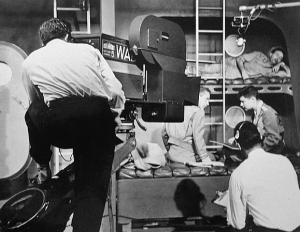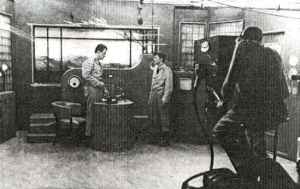The creation of the new CW and MyTV Networks promised to firmly establish a fifth and sixth network in American television, filling the roles that were once occupied by The WB and UPN respectively. Today with the advent of cable and satellite, networks are created and renamed with little consequence. However, there was once a time when the death of a single network signaled the end of an era, and set standards in American broadcasting for the next 50 years.
The Dumont Network, America’s first fourth television network, launched in the late 1940’s with a handful of stations across the country and very little programming. Dumont Laboratories, a popular television manufacturer of the day, launched the channel in hopes of breaking ground and attracting viewers with experimental programming. Unlike its’ competition, Dumont didn’t have a radio network or a staple of talent to draw from. In many cities, it didn’t even have a dedicated television station to air its’ programming.

In most cases, Dumont had to share time with other networks, and local affiliates cherry picked which of the two networks’ programs they would air. This in turn made the schedules for those stations completely erratic, and more often than the only Dumont programming that would find its way onto a shared schedule were sports broadcasts.
Thanks to a groundbreaking step by Dumont, these sports broadcasts, and other programs were aired live from the Midwest for the first time. Prior to that all live television broadcasts were only aired from the East Coast due to technological limitations. Dumont embraced this new technology and aired nearly every program they produced live, which became a staple for the network.
Not only did the Dumont Network break ground by pioneering new technology, but also in terms of programming. They developed the first television sitcom, ‘Mary Kay and Johnny,’ and the first network soap opera, ‘Faraway Hill.’ In addition, they originally aired ‘Cavalcade of Stars,’ a popular variety show whose comedy skits were the foundation of ‘The Honeymooners.’ Many of these shows were produced on the cheap to compensate for the network’s low advertising revenue. Dumont created business models for cheap programming that its’ competition would follow for decades.

Unfortunately, the network still suffered from a lack of dedicated stations to air their programming. In the early 1950’s the FCC prevented broadcast networks from launching or expanding, as literally thousands of companies attempted to flood the market to capitalize on the popularity of television. This left the two smaller existing networks, Dumont and ABC, struggling for both airtime and advertising revenue in the early part of the decade. ABC had staved off bankruptcy by merging with an offshoot of Paramount Studios, which provided Hollywood stars and connections that Dumont simply couldn’t compete with. Even their most popular stars, including Jackie Gleason or Morey Amsterdam, left for ABC and NBC, capitalizing on the success of their Dumont series.
With no other way to earn revenue, Dumont was finally forced to sell off the first of its’ three broadcast stations in 1955, and eventually signed off for good within a year. Those stations that had once aired Dumont programming were forced to change their line-ups, giving more airtime to competitors, and the growing market for local programming. It wasn’t until after Dumont had gone under that ABC was able to acquire enough broadcast stations and the “Big Three” dominance of American television was established.

Smaller, local broadcast networks eventually formed throughout the country as the FCC regulations began to ease up. UHF stations, which could only be accessed by more expensive television sets, provided an outlet for independent broadcasters hoping to provide more choices for the American television audience. It wasn’t until the formation of the FOX Network in 1986, that the country had its’ first viable fourth broadcast network since the death of Dumont 30 years earlier.
Today Dumont’s legacy lives on not only in FOX, but in the new CW and My13 Networks as well. In fact, many of the stations that once carried Dumont’s programming 50 years ago are now CW and My13 affiliates. Unfortunately, very few copies of Dumont’s original programming still exist, and most are believed to have been destroyed or thrown away in the decades following the network’s demise.
Thanks to both the successes and failures of the Dumont Network the framework of American television was set for decades. Although their time was brief, it’s likely that in half a century scholars will be saying the same thing about the WB and UPN, networks which brought us such gems as ‘Homeboys from Outer Space’ and ‘Birds of Prey’.






